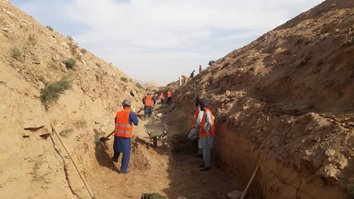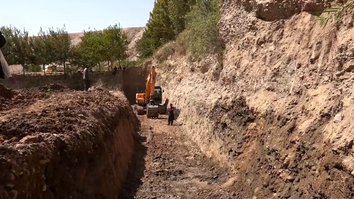KUNDUZ -- Two newly constructed canals in Khulm district of Samangan province are providing much needed water to the area, say local authorities.
Construction of the canals has resolved water shortage problems for 3,000 hectares of land, according to Abdul Qodus Radmard, an official at the Department of Khulm River Basin in Samangan province.
The Programme Implementation Unit of the Northern Zone at the Ministry of Energy and Water managed the construction of the two canals, which were turned over to the public on December 29, 2021.
The canals were built with 102.1 million AFN funded by the World Bank.
"The first canal, constructed in the Qachar area of Khulm district, is 1,560 metres long, 2.5 metres wide, and 1.5 metres high," Radmard told Salaam Times on January 13.
"Iron gates have been installed in the canal to regulate the flow of water and prevent flooding."
The second canal, constructed in the Chuchaman area of the Khulm district, is 1,769 metres long, 2.5 metres wide and 1.5 metres high, also with iron gates, he said.
Addressing flooding risks
Due to their traditional construction, the old canals would get damaged every year during wet seasons, locals said.
But with the standard construction of the new canals, lands are safer and properly irrigated.
Abdul Waheed, 48, a farmer in Khulm district, said he and other locals had been struggling with this problem for several years and that farmers could not easily grow wheat or rice on their land.
"We are happy now that our canal has been constructed properly," he said. "Farmers are now eager to grow wheat and rice and will have good yields, God willing."
"I have two hectares of land, but after my farms were damaged by flooding for four consecutive years, I decided not to cultivate my lands anymore," said Sayed Rasool Hashimi, a farmer in Khulm district.
The old canal could not could not withstand floodwater pressure and would be damaged with each flood, destroying the farms, he said.
Now that our main issue is taken care of and our canal can withstand floods, water is flowing in the canal and we can cultivate our land, he said.
Water for drinking
The new water canals are also providing more than 2,000 families with closer access to water.
"These families used to carry water on donkeys from wells or from the river, which was five to 10kms away from their homes," said Mohammad Asif Tanweer, a local elder in Khulm district.
"Residents of Shahikhail, Chehl Dozd, Ghaziabad, Khwaja Alghar, Khosh Toot, and other villages living close to the canal can now use water from the canals for drinking," he said.
"We call on the current government and aid agencies to dig deep wells and build water supply networks in this district so that drinking water shortages are permanently resolved," he said.
Sayed Farooq Akbari, a member of the Local Development Council in Samangan, said most Khulm district children have been drinking non-potable water and suffer from infectious diseases, especially diarrhea.
"Based on our information, about 15,000 families that are living in the Lalam area of Samangan province are faced with drinking water shortages," he said.
These families usually either travel a long distance to fetch drinking water from rivers and streams, he added.
"If clean drinking water is provided from deep wells through water-supply networks, then the spread of infectious diseases such as diarrhea, typhoid and cholera that are caused by unclean water would be prevented as well," Akbari said.

![As part of the United Nations Development Programme (UNDP)'s cash-for-work project, labourers clean a canal in Herat city on December 1. Two new canals funded by the World Bank are now providing water to families in Samangan province. [File]](/cnmi_st/images/2022/01/21/33678-u_2-585_329.jpg)







Water and electricity are the necessities of life. There is no life without water. It is mentioned in the Holy Qur'an that we have kept everything alive on the water. However, in addition to the blessings of nature, humans also have to try their best. In the spring, for example, nature makes our villages, fields, and deserts green, our rivers flowing, but if we do not build dams for these flowing waters, this water will flow freely to the neighboring countries that they use in every section; however, if this water is controlled, on the one hand, it will sustain the greenery that the spring bestowed us with, and on the other hand it will generate electricity which can make us competitive with others in terms of industry and technology. Do not waste water. In the first chapter of the last part of the Holy Quran, Allah says, "if your water goes so deep, who will give you clear water? Allah is great. May Allah have mercy on all His creatures.
Reply2 Comment
Even though, the previous government boosted the corruption and promoted it in all governmental agencies, some of its actions were valuable, such as providing opportunities for international donors to contribute to Afghanistan’s reconstruction and to fund important development projects. It was because of these actions that the government was popular among the people of cities and villages. If the current government wants to be popular among the people, and the people forgive all their crimes, they must accept the conditions of the international community for their recognition and they must establish friendly relations with the international community so that the donors can come to the country again, to assist the government in rebuilding the country. This will reduce the distance between the people and the government, and the people will forgive the crimes of the Taliban that they have committed in the last twenty years, and will support their government.
Reply2 Comment